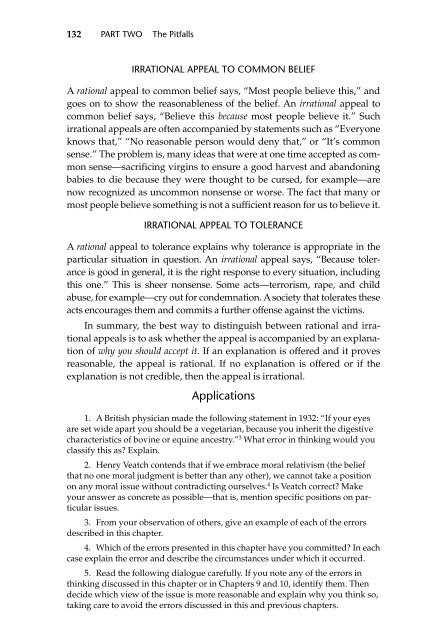Beyond Feelings
Beyond Feelings
Beyond Feelings
You also want an ePaper? Increase the reach of your titles
YUMPU automatically turns print PDFs into web optimized ePapers that Google loves.
132 PART TWO The Pitfalls<br />
IRRATIONAL APPEAL TO COMMON BELIEF<br />
A rational appeal to common belief says, “Most people believe this,” and<br />
goes on to show the reasonableness of the belief. An irrational appeal to<br />
common belief says, “Believe this because most people believe it.” Such<br />
irrational appeals are often accompanied by statements such as “Everyone<br />
knows that,” “No reasonable person would deny that,” or “It’s common<br />
sense.” The problem is, many ideas that were at one time accepted as common<br />
sense—sacrificing virgins to ensure a good harvest and abandoning<br />
babies to die because they were thought to be cursed, for example—are<br />
now recognized as uncommon nonsense or worse. The fact that many or<br />
most people believe something is not a sufficient reason for us to believe it.<br />
IRRATIONAL APPEAL TO TOLERANCE<br />
A rational appeal to tolerance explains why tolerance is appropriate in the<br />
particular situation in question. An irrational appeal says, “Because tolerance<br />
is good in general, it is the right response to every situation, including<br />
this one.” This is sheer nonsense. Some acts—terrorism, rape, and child<br />
abuse, for example—cry out for condemnation. A society that tolerates these<br />
acts encourages them and commits a further offense against the victims.<br />
In summary, the best way to distinguish between rational and irrational<br />
appeals is to ask whether the appeal is accompanied by an explanation<br />
of why you should accept it. If an explanation is offered and it proves<br />
reasonable, the appeal is rational. If no explanation is offered or if the<br />
explanation is not credible, then the appeal is irrational.<br />
Applications<br />
1. A British physician made the following statement in 1932: “If your eyes<br />
are set wide apart you should be a vegetarian, because you inherit the digestive<br />
characteristics of bovine or equine ancestry.” 3 What error in thinking would you<br />
classify this as? Explain.<br />
2. Henry Veatch contends that if we embrace moral relativism (the belief<br />
that no one moral judgment is better than any other), we cannot take a position<br />
on any moral issue without contradicting ourselves. 4 Is Veatch correct? Make<br />
your answer as concrete as possible—that is, mention specific positions on particular<br />
issues.<br />
3. From your observation of others, give an example of each of the errors<br />
described in this chapter.<br />
4. Which of the errors presented in this chapter have you committed? In each<br />
case explain the error and describe the circumstances under which it occurred.<br />
5. Read the following dialogue carefully. If you note any of the errors in<br />
thinking discussed in this chapter or in Chapters 9 and 10, identify them. Then<br />
decide which view of the issue is more reasonable and explain why you think so,<br />
taking care to avoid the errors discussed in this and previous chapters.


